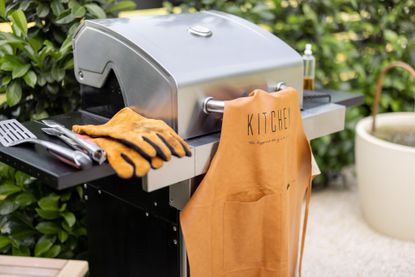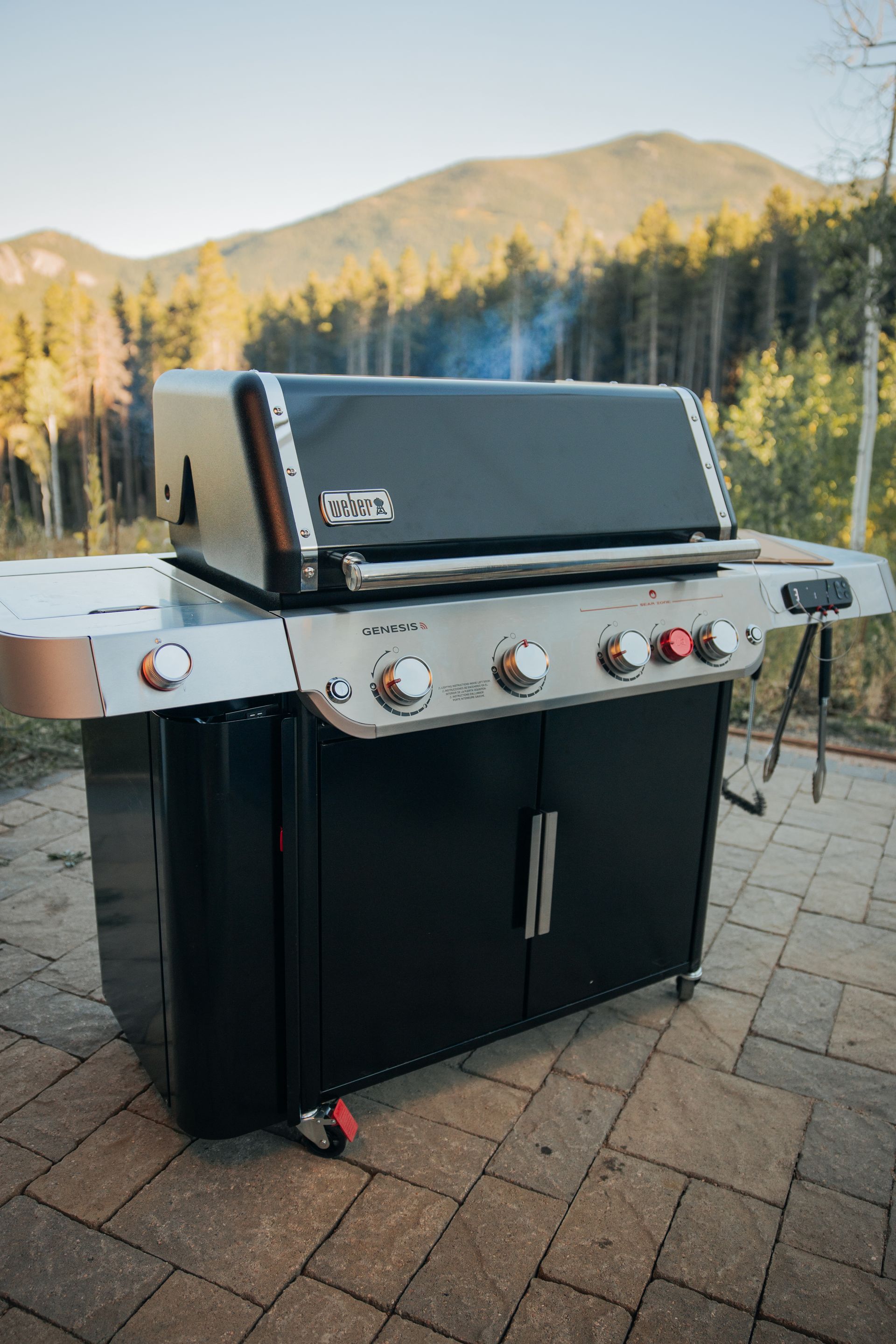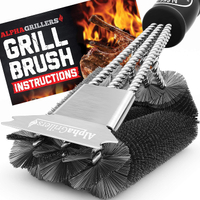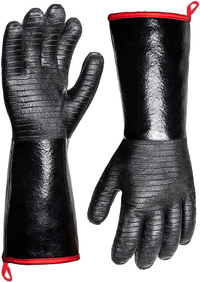How to season a gas grill for the first time - the secrets from the professional pitmasters
Seasoning a grill is crucial to prepare your grates for cooking and protect them in the long term. These experts explain how it's done


After what seems like an age, January is finally over. While balmy evenings in the backyard are still a way off, keen cookers will be itching to fire up the barbecue at the first sign of spring sunshine, especially if it's brand new. Before you throw the sausages on, however, you'll need to know how to season a gas grill for the first time.
Seasoning a grill is the kind of job you might be tempted to skip just because it sounds tedious, but it's actually a crucial step to prepare your grates for cooking and protect them in the long term. It's also far easier than you might think. The whole job should be over and done within half an hour.
To learn how to properly season your grates for a longer-lasting grill and a better-tasting barbecue, we spoke with some professional pitmasters who are well-accustomed to the task. Below, they share their top tips to ensure you're working with the best gas grill possible.

Outdoor chef and food lover, Dan Cooper is Head Grill Master for Weber Barbecues and has worked for the company for 11 years. His role for the last decade has involved educating a large portion of Europe as to The Weber Way of grilling. This includes developing recipes, training the Grill Academy chefs, and working with the brand’s hotel and restaurant partners. Dan is a huge advocate of high-quality meat and produce, and, using his experience, creativity, and passion for food, he ensures high standards and quality is maintained across the board.
What does it mean to season a grill?

Before we dive into the nitty gritty, what does it actually mean to season a grill? And before you ask, no, it doesn't mean sprinkling your favorite herbs and spices onto the grates.
'Seasoning, also known as ‘curing’, is usually done by heating the metal grates, adding oil, then allowing it to cool and absorb,' explains Dan Cooper, Head Grill Master at Weber. 'Doing so will protect your grill from rust and extend its life.'
The process of heating and oiling the grates will keep your barbecue operating at its best while also making it easier to clean your grill after cooking. It's recommended that you find time to do this after every use but, just as you'd season a brand-new frying pan before cooking, it's especially important to season a gas grill the first time you use it.
Why do you need to season a grill before you use it for the first time?

If you haven't used your brand new grill before, neither has anyone else. This means the grates won't have been oiled, heated, or have cooked any food until now. Seasoning a grillfor the first time, therefore, is a bit like training it in preparation for its first meal.
'In some cases, cast iron and carbon steel cooking grates will be very vulnerable to rust if heated and cooled down multiple times,' explains Dan. 'Seasoning an uncoated cooking grate will lock in protective oils that will help extend the cooking grates life and help it to work better.'
Besides making your grates last longer, seasoning is also essential for that smoky outdoor barbecue flavor we all crave. 'It's important to season a grill before using it for the first time not only because it helps protect the grill grates from rust, but it also improves the flavor of the food,' says Jakob Miller, pitmaster and founder of Barbecue Pals. Seasoned grates will also help you achieve those perfect grill marks, too.
How to season a grill for the first time

1. Place your clean grate on the barbecue over a medium heat
Even if they're brand-new, it's always a good idea to give your grates a quick clean in the kitchen to remove any dust or debris that's collected from being sat in storage. If you're seasoning a grill you've used before, you'll need to clean the grates with a wire brush. Once clean, place your grates on the grill and turn it up to a medium heat.

GrillArt Grill Brush and Scraper, Amazon
Save yourself some pennies with this two-in-one grill brush and scraper from GrillArt, available at Amazon. This multifunctional tool is your ultimate weapon against dirty grates, bad-tasting meat, and an unhealthy barbecue. It makes your cleaning job twice as fast too!
2. When hot, apply a small amount of oil
After ten minutes (or once the grill is sufficiently hot) apply a small amount of oil - just enough to cover the entire surface. 'Use your brush to spread the oil over the grates, making sure you apply a thin, even layer,' says Dan. High-smoke point oils such as canola and peanut oil work best, but coconut oil or standard vegetable oil will work just as well. Turn the grill to high heat for around 15 minutes to allow the oil to cure. Make sure you wear protective gloves for this step.
3. Let the grates cool
When the oil reaches its smoking point (around 15 minutes) turn off the barbecue and let the cooking grates cool. You might want to repeat the oiling process again for a brand-new grill.

Heat-resistant barbecue gloves, Amazon
These heat-resistant gloves will be perfect for seasoning, cleaning, and cooking on your grill. When apply the oil during curing, you'll want to make sure you wear protective gloves to prevent any burns and these textured non-slip gloves are just the ticket. They're even resistant to temperatures up to 932°F!
4. Wipe away excess oil
Finally, once your grates are cool, wipe away any excess oil from the surface using a cloth or rag. You are now ready to start grilling.
Now you've seasoned your gas grill for the first time, the alfresco dining can officially commence. Those long evenings cooking feasts for friends in your outdoor kitchen are just around the corner... At last!
Be The First To Know
The Livingetc newsletter is your shortcut to the now and the next in home design. Subscribe today to receive a stunning free 200-page book of the best homes from around the world.

Lilith Hudson is the News Editor at Livingetc, and an expert at decoding trends and reporting on them as they happen. Writing news, features, and explainers for our digital platform, she's the go-to person for all the latest micro-trends, interior hacks, and color inspiration you need in your home. Lilith discovered a love for lifestyle journalism during her BA in English and Philosophy at the University of Nottingham where she spent more time writing for her student magazine than she did studying. After graduating, she decided to take things a step further and now holds an MA in Magazine Journalism from City, University of London, with previous experience at the Saturday Times Magazine, Evening Standard, DJ Mag, and The Simple Things Magazine. At weekends you'll find her renovating a tiny one-up, one-down annex next to her Dad's holiday cottage in the Derbyshire dales where she applies all the latest design ideas she's picked up through the week.
-
 Exactly When to Fertilize a Lawn After Winter — Experts Guarantee You a Beautiful Backyard All Year
Exactly When to Fertilize a Lawn After Winter — Experts Guarantee You a Beautiful Backyard All Yearif you know when to fertilize a lawn after winter then you can set yourself up for a well manicured and healthy backyard all year long
By Jacky Parker Published
-
 How to Make a White Bathroom Feel Warm — 5 Tricks Designers Use For a Cozier and More Restful Spaces
How to Make a White Bathroom Feel Warm — 5 Tricks Designers Use For a Cozier and More Restful SpacesGive your all-white bathroom a glow-up with these tips for bringing warmth to the space
By Oonagh Turner Published

